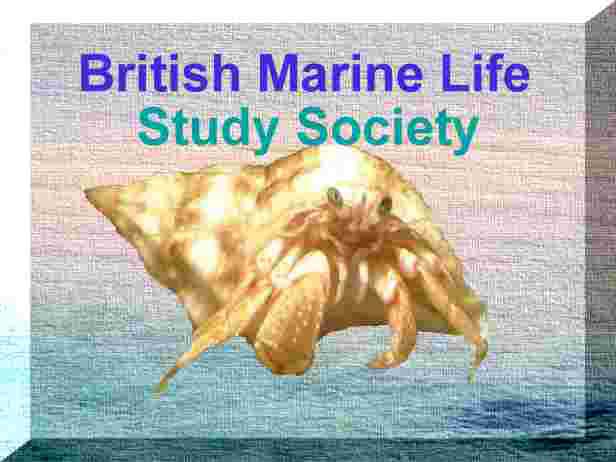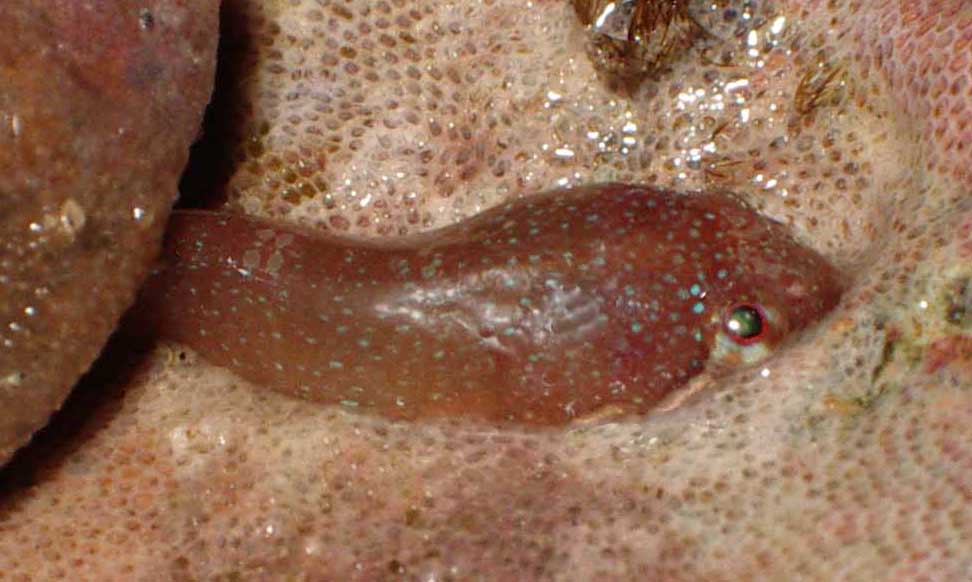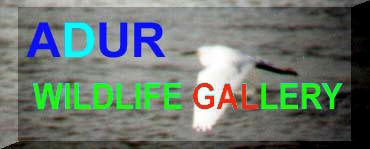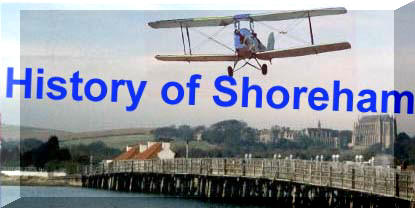
|
NEWS BULLETIN FOR THE ADUR VALLEY |
 |
| LOCAL
ORGANISATIONS |
| LOCAL RESIDENTS PAGE |
| Adur Flood Plain |
| Chalk Downs |
| Coastal Fringe |
| Intertidal (Seashore) |
| Nature
Notes for
Lancing Ring |
| River Adur Estuary |
| River Adur |
| Sea (off Sussex) |
| Town & Gardens |
| Widewater Lagoon |
| AREA MAP |
| Shermanbury (Adur Valley) |
| WSCC LIBRARY |
|
|

This is the first published
Electronic Newspaper for
Shoreham-by-Sea and the
Adur Valley & District, West Sussex, England
Local News
Thousands of tonnes of spoil is dumped on New Monks Farm, Lancing, and diggers are rearranging the land.
Clubs and societies are invited to hold an evening Adur World Oceans Day event.
See below for the AWOD events pencilled in for the Adur Festival 2003.
Please send any comments to: Andy Horton
Glaucus@hotmail.com
Wildlife Notes
25 April 2003Adur World Oceans Day 2003
The next meeting of the Adur World Oceans Day group. All the major participants should confirm their attendance before this day so that the organisation for publicity, planning logistics and other arrangements can be progressed.
Acrobat Information File on Adur World Oceans Day 2003
-----------------------------------------------------------------------------
WILDLIFE REPORTS
30 March 2003
An Osprey flew in quite low off the sea, this was just east of Widewater, it circled round and round gaining height over the sea and beach, then circled over towards the Adur estuary where what I think was a Sparrowhawk sparred briefly with it, the Osprey then came back towards me circling higher and higher, before embarking on one of those flapless, effortless glides on slightly angled wings NNE into the wind, it gave only two flaps before it vanished as a speck in the distance inland, in all I guess I watched it for around 15 mins - absolutely splendid!Report by Colin Holter on Sussex Ornithological Society NewsA sunny spring day with a handful of Small White and Small Tortoiseshell Butterflies were in flight over Buckingham Park, Shoreham.28 March 2003
A Short Eared Owl was seen twice in the early evening over New Monks Farm, Lancing.Report by Bob Kent (Lancing) on the Sussex Birds Yahoo Group
27 March 2003
I spotted by first white butterfly of the year, probably a Small White Butterfly over the Hamm Road allotments (Eastern Avenue) Shoreham.
Adur Butterflies24 March 2003
It seemed as though the Little Egret flying over the Old Fort was following a small fishing boat up the River Adur. Was it same one feeding in the stream next to the towpath by Shoreham Airport? Spring seems to have finally arrived. It looked like a couple of Swallows diving rather low over the same unappealing stream. There was a local buff coloured Meadow Pipit with its dipping flight over the Sea Purslane at low tide.Scores of Small Tortoiseshell Butterflies and Buff-tailed Bumblebees were around the fringes of Shoreham town and on the Coombes road and a single Peacock Butterfly settled on the cycle path by the Cement Works. The yellow flowers by the roadside were Lesser Celandine. There were hundreds of sheep and newly born lambs (with blue tags in their ears) in the fields adjoining the road especially near Church Farm, Coombes.
Vernal Equinox
Bumble Bee Page23 March 2003
Butterflies of Lancing
A Comma Butterfly was in in my south Lancing garden pond (TQ 186 044) nectaring on Viburnum xbodnantense. This is the earliest in the year that I have seen this species of butterfly.20 March 2003
A Brimstone Butterfly was seen near to Lancing Manor Allotments at the foot of McIntyres field.Report by Jan Hamblett on the Lancing Nature Smart Group
19 March 2003
A steady stream of orange-tailed bumblebees were observed flying eastwards over the shingle beach to the seaward edge of Widewater Lagoon. Over a period of two hours, a bee must have passed every 30 seconds and I estimated the total numbers passing at about 136. Later in the afternoon a smaller fly-pass occurred.Report by Bob Kent (Lancing) via the Lancing Nature Smart GroupNB: The species was probably the Red-tailed (Jewel) Bumble Bee, Bombus lapidarius.
Shoreham Beach pageFrog tadpoles (pic) hatch out in my south Lancing garden pond (TQ 186 044) and a pair of Magpies, from the Hawthorn tree, pinched the turf from the pond's edge.
The Small-headed Clingfish is about 10 mm long
The low equinoctial spring tide receded as far as I have known it uncovering all the rocks on Lancing Beach. It was too dark to explore the exposed shore properly, but juvenile Small-headed Clingfishes (probable ident.) were present under rocks, with hundreds of crabs and a chiton, a full sized Acanthochitona crinita. The chiton is 29 mm long and 20 mm at its widest part. The sea anemone Sagartia troglodytes was common and the Snakelocks Anemone frequently seen.
Species List
BMLSS Chiton page
BMLSS MolluscsThere were two pairs of Shelducks at the eastern end of Widewater Lagoon.
The bumblebee on the railway path near the Toll Bridge, Old Shoreham, was striped orange and black. This was a queen (the orange pollen basket indicates) of the Buff-tailed Bumblebee, Bombus terrestris, which is the commonest species locally. The white (not buff) tail is usually very clear with this species: its most distinguishing feature. (The White-tailed Bumblebee, Bombus locurum is similar but smaller with a lemony coloured band.)
The chirrupy calls of the Robin Redbreast were noticeable north of the Toll Bridge, and a particularly colourful Chaffinch singing from a tree on the short path from Botolphs to the River Adur (just to the north of the South Downs Way bridge). To the north of the path it appears to be recently (2001?) neglected or set-aside land, notably better in wildlife than the adjacent arable lands. Small Tortoiseshell Butterflies were seen near shelter in the valley, but only about six of these butterflies were flying strongly and not settling.
A Little Egret was the only bird in the first flood plain field north of the Toll Bridge (field artificially seeded for cattle). This field tends to be damp with deep drainage streams around the edge.
Adur Levels17 March 2003
My first butterfly of the year was a Small Tortoiseshell flying strongly over Gordon Road, Shoreham town centre, on a sunny hazy day. Of the birds calling during the day, the Collared Doves, Herring Gulls and Song Thrush were the loudest and most strident, joined by the melody of the Blue Tit on the lower slopes of Mill Hill, south of the by-pass.It was is in this area that a group of three Small Tortoiseshell Butterflies, were seen and photographed and another three on Mill Hill near the reservoir. The shade air temperature reached 13° C.
A Red-tailed (Jewel) Bumble Bee, Bombus lapidarius, crawled out of the long grass just south of the reservoir. There was a small orange mite on its abdomen. This species of bumblebee is the second commonest locally throughout the year.
Bumble Bees
Social Bees
Parasites on Bumblebees
Classification of Acari
Six Common Species of Bumblebees (UK)
World List of Bumblebees (NHM)
16 March 2003
As the sun set and full moon illuminated the early evening, there was an astonishing amount of bird song in the scrubs from Withy Patch with birds communicating over four lanes of the A27, and various bird calls were heard continuously all the way down the path south of Toll Bridge in the bushes by the old railway track, and again in the scrub and small trees by the railway main line at the southern end of Raven's Road, Shoreham. It appeared that most of the singing came from Blackbirds and other thrushes.
On beach near the Brooklands outfall pipe, three Turnstones could be approached quite closely before they flew off calling. Twenty Sanderlings pattered over the sand surface and there was a few Ringed Plover as well. Alas the low tide of 1.06 metres did not uncover as many rocks as known before, and the intertidal fauna was exiguous, limited to a few common species including the Hairy Crab and small sea anemones Sagartia troglodytes, Beadlet Anemone and a single Snakelocks Anemone. There were numerous Dogwhelks on the mussel beds on the Brooklands pipe.
BMLSS Rockpooling Page
A flock of about a dozen Jackdaws perched on the Linde trees (Small-leaved Lime) in The Drive (near Buckingham Park), Shoreham-by-Sea, (TQ 219 063).15 March 2003
One Red Admiral Butterfly, very large and perfect, was hovering in the sun and five Small Tortoiseshell Butterflies were seen in my Lancing garden.Report by Gary Lane via the UK-Leps EForumAdur Butterflies14 March 2003
British Butterflies Flight Times
The first Small Tortoiseshell Butterfly of the year visited my south Lancing garden in the sunshine with a gentle north-east breeze. (TQ 186 044).
On the mud flats south of Old Shoreham Toll Bridge the low spring tide had receded a low way so in the fading light it was difficult to identify some of the wading birds through my low powered (10 x 25) binoculars. There were fifteen medium-sized wading birds in the shallows on the water's edge. At least three were Redshanks as the red colour of their legs discerned as they trotted quickly over the mud itself, but the other waders appeared to be a different species, with black legs and bill and a dark head (possibly Godwits?). They were very active wading in water up to their knees, probing very deeply into the mud. They were probably all Redshanks, but it is unusual to see them on Adur in small flocks - they are usual single, with perhaps a couple more in close proximity. Much easier to recognise, were a pair of Shelducks, just a solitary Dunlin, three Mute Swans, a couple of feeding Little Egrets and a couple of Great Black-backed Gulls.
A flock of about a dozen Jackdaws foraged around the green mown grass of the Holmbush roundabout, north-east Shoreham.8 March 2003
There were five ducks up-ending themselves to feed in Widewater Lagoon (eastern end). Some 25% smaller than Mallards, I have penned these in as Teals. One of them was chased by an aggressive Black-headed Gull.5 March 2003
A pair of Mandarin Ducks were seen on Brooklands Boating Lake this evening. This is a "naturalised" alien species from the Far East (China and Japan) has escaped from captivity and breeds in south-east England.
At 3:30 pm a single Swallow flew up the Adur then low across the Shoreham Airport heading north west. A real early bird?Reports by Bob Kent (Lancing) on the Sussex Birds Yahoo Group
4 March 2003
A Goldcrest was in in my south Lancing garden in the rain, again. (TQ 186 044). This was a bright spark on a murky overcast grey day.Lost & Found "Birds of Prey"
2 March 2003
An escaped Eagle with jesses was seen over Cokeham Reed Beds, Sompting. It was mobbed by crows and seen heading for the downs. This bird was not a Harris Hawk identified from Cissbury later in the month.

- British
Web Sites
Dragonflies
of the Hampshire & Surrey Borders
Flight
Times (First Seen)
- Historical
Snippets
An aquamanile is the largest and most impressive discovery from the Ropetackle archaeological dig on Ropetackle undertaken by Archaeological South-east.
'Noo-Noo'
is a green-glazed ceramic aquamanile in the stylised shape of a ram,
probably
manufactured in the Scarborough area in the late 13th century. He is about
30 cm from snout to tail and about 25 cm from the base of his front legs
to the top of his horn (only one survives).
Only
two such complete examples are known from Sussex (from Seaford and
Lewes
: both found in the 19th century). International discoveries of complete
ceramic aquamaniles are rare, because they are delicate and easily damaged.
Information
from Simon Stevens (Chief Archaeologist, Archaeology
South-East)
Evening
Argus Report 1 of Ropetackle Finds
Evening
Argus Report 2 of Ropetackle Finds
Adur Valley Book List
- Words
of the Week.
aquamanile | akwmnLli, -nili | n. L19. [Late L f. L aquaemanalis hand-basin, f. aquae genit. sing. of aqua water + manale ewer.] A water vessel or ewer, freq. in the form of an animal or bird.
satya
| sLtj | n. M20. [Skt.] Indian Philos. Truth, truthfulness.
satyagraha
| sLtjrh | n. E20. [Skt satyagraha force born of truth, f. satya
truth + agraha pertinacity.] 1 Hist. A policy of passive resistance to
British rule in India formulated by M. K. Gandhi. E20. 2 gen. Any
policy of non-violent resistance. E20. satyagrahi n., pl. -is, same, [mod.Skt
satyagrahi] an exponent or practitioner of satyagraha E20. satyagrahist
n. = SATYAGRAHI M20.
jess | des | n. & v. ME. [OFr. ges nom. sing. & accus. pl. of get (mod. jet cast) f. Proto-Romance var. of L jactus a throw, f. jacere to throw.] A n. A short strap of leather, silk, or other material fastened round each of the legs of a hawk used in falconry, usu. having a small ring to which a leash may be attached. Usu. in pl. ME. B v.t. Put jesses on (a hawk). M19.jessed | dest | a. (of a hawk) furnished with or wearing jesses; Her. having jesses of a specified tincture: E17.
aestivation
| istve()n, est- | n. Also USest-. E17. [f. as prec.: see -ATION.]
1 The spending of summer; summer residence. E17-M18. 2 Bot. The arrangement
of the parts of a flower inside its bud before opening. Cf. VERNATION 1.
E19. 3 Zool. The act of spending the summer in a state of torpor. Cf. HIBERNATION.
M19.
e.g.
butterflies
acarology | akrldi | n. E20. [f. as ACARIASIS + -OLOGY.] The branch of science that deals with mites and ticks. acarologist n. L19.
phoresy | frisi, frsi | n. E20. [Fr. phoresie, f. as prec.: see -Y3.] Zool. An association in which one organism is carried by another, without being a parasite on it. phoretic
deracinate | drasnet | v.t. literary. L16. [f. Fr. deraciner (OFr. des-), f. de- DE- 3 + racine root: see -ATE3.] Tear up by the roots (lit. & fig.), eradicate. deracination n. E19.
laconic | lknk | a. & n. In sense A.1 L-. M16. [L Laconicus f. Gk Lakonikos, f. Lakon: see prec., -IC.] A adj. 1 Of or pertaining to Laconia (see prec.) or its inhabitants; Lacedaemonian, Spartan. Now rare. M16. 2 Using few words, concise, terse, (the Spartans being known for their terse speech). L16. B n. 1 A laconic speaker. Only in 17. 2 Laconic or concise speech; in pl., brief or concise sentences. rare. E18.laconically adv. E17. laconicism | lknszm | n. (a)brevity in speech or writing; (b)a short pithy sentence: M17.
sibilate | sblet | v. M17. [L sibilat- pa. ppl stem of sibilare: see prec., -ATE3.] 1 v.i. Hiss; make a hissing sound. M17. 2 v.t. a Pronounce or utter with a hissing sound. M19. b Hiss at (a person), esp. as a sign of disapproval. M19.sibilation n. (a)the action or an act of sibilating, esp. as a sign of disapproval; (b)a hissing or whistling sound: L15. sibilator n. (rare) a person who hisses or whistles LME. sibilatory a. characterized, accompanied, or expressed by hissing M19.
edaphic | dafk | a. L19. [f. Gk edaphos floor + -IC.] Biol. Of the soil; produced or influenced by the soil. edaphically adv. M20
mezzanine
| meznin | n. & a. E18. [Fr. f. It. mezzanino dim. of
mezzano
middle, medium, f. L medianus MEDIAN.] A n. 1 A low storey between two
others in a building, usu. between the ground floor and the floor above.
E18. b Theatr. A floor beneath the stage, from which the traps are worked.
M19. c The lowest gallery in a theatre or cinema; a dress circle. N. Amer.
E20. 2 A small window at the level of a mezzanine or attic. M18.
1c New Yorker I was in a
movie house, fairly plush, in a sort of mezzanine, or balcony.
B adj. 1 Designating
an intermediate floor, storey, etc. M19. 2 Comm. Designating unsecured,
higher-yielding loans that are subordinate to bank loans and secured loans
but rank above equity. L20.
2 Observer Before1983, potential
raiders looked to venture capitaliststo provide mezzanine finance.
tarsal | ts()l | a. & n. E19. [f. TARSUS + -AL1.] A adj. 1 Anat. & Zool. Of or pertaining to the tarsus of the ankle or foot. E19. 2 Anat. Of or pertaining to the tarsi of the eyelids. M19. B n. A tarsal bone, joint, etc. L19.
Coleoptera
| klpt()r | n.pl. Rarely in sing. -ron | -rn | . M18. [mod.L,
f. Gk koleopteros sheath-winged, f. koleos sheath + pteron wing: see -A3.]
(Members of) a large order of insects having the front wings modified as
hard wing-cases, and comprising the beetles (including weevils).coleopteran
n. & a. (a member) of the order Coleoptera M19. coleopterist
n. a person who studies beetles M19. coleopteroid a. resembling or akin
to a member of the order Coleoptera L19. coleopterous a. belonging or pertaining
to the order Coleoptera L18.
- NEW

|
Web
Monkey :The
Web Developer's Resource
Location:
http://hotwired.lycos.com/webmonkey/
Digital
Photography Review
http://www.dpreview.com/
Computing Net Support Site (for computing problems) ****
http://computing.net/windows95/wwwboard/wwwboard.html
The upsurge of EFora on
all subjects (a
few have been recommended before in these bulletins) are an important way
in which the Internet
will change the world.
A list of recommended eFora
are shown in the left hand column. Please make any suggestions.
Smart
Groups
At
present almost all groups are receiving sustained attacks by spam mail
(junk mail) which is a serious nuisance.
Fight
Spam on the Internet
http://spam.abuse.net/
LiteratureNicolas Breton
A very strange old house which had been lived in by an eccentric Englishman who collected everything...the house was like a museum. Dark ....and very spooky!! In one room these words were written in relief around the four walls:
A wise man is like a dial,
That being set right by the sun keepeth his true course in his compass.
He measureth time and tempereth nature,
He employeth reason and commandeth sense and envieth none.-------------------------------------------------------------------------------
Breton, Nicholas
(brt´n) (KEY) , 1551?–c.1623, English author, a prolific and versatile writer of verse and prose. His best work, written in a lyrical and pastoral vein, appeared in The Arbor of Amorous Devices (1597), England’s Helicon (1600), and The Passionate Shepherd (1604). 1
See his poems (ed. with biography by J. Robertson, 1952); A Mad World My Masters and Other Prose Works (ed. by U. Kentish-Wright, 1929).
------------------------------------------------------------------------------------------------------------------------
Excerpted from
The Columbia Encyclopedia, Sixth Edition. 2001.
Image Gallery

Field north of The Street
This AONB land is not included in the
South Downs National Park boundaries
Photograph by Andy Horton
Adur Census 2001 Profile
Peregrine
on the West Pier (19 June 2002)
More
Dragonfly Photographs
Religion in the Adur District (Churches)
Archaeology in Sussex to AD 1500 ****
WSCC
LIBRARY *****
Excellent
and essential service with a full catalogue of books, CDs, videos, on-line
renewals, book ordering.
- The
Glaucus 2002 CD-ROM includes the complete Shoreham-by-Sea
and Adur Valley web sites.

ADUR VALLEY EFORUM PAGE |
Events
Farmer's Market
Second
Saturday every month
Last:
14 April 2003
Next:
10 May 2003
Fresh
produce
East
Street, Shoreham-by-Sea
|
- Please send in any details of local events.
- Web
Sites
American
Heritage Dictionary of the English Language:
Fourth
Edition *****
- SPONSORSHIP OPPORTUNITY
For any company or organisation wanting nationwide green publicity, there is an opportunity to sponsor the journal "Glaucus" of the British Marine Life Study Society.
There remains sponsorship opportunities on the BMLSS (England) web site and other publications, including Torpedo.
Sponsorship is also available for the Adur Torpedo Electronic News Bulletin and the Shoreham-by-Sea web pages (which preceded the Adur Resource Centre web site), which would be more suitable for a local firm(s).
Web Site Design Services are available from Hulkesmouth Publishing
Normal
advertisement rules apply.
Submissions
accepted by EMail only.
Adur Torpedo was written, designed and distributed by Andy Horton.













 31
May 2003
31
May 2003
